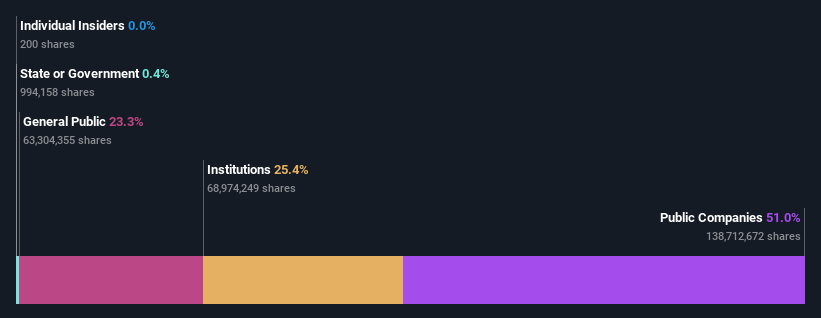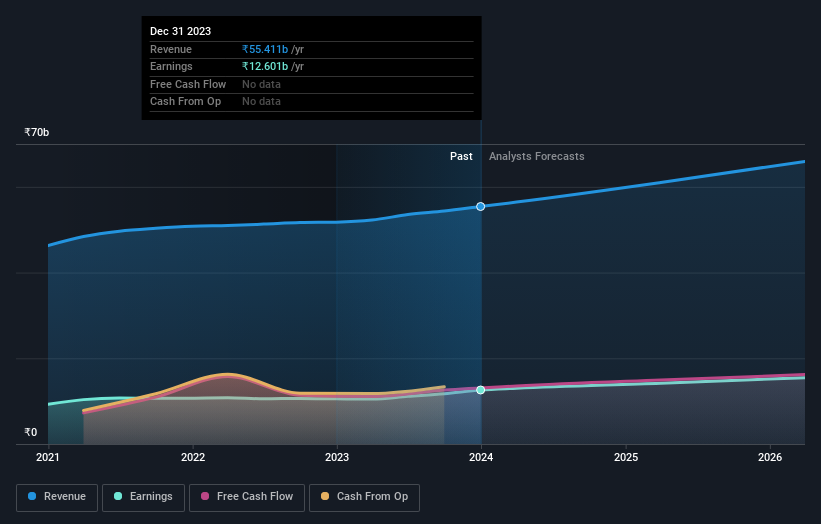Stock Analysis
- India
- /
- Personal Products
- /
- NSEI:COLPAL
Colgate-Palmolive (India) Limited's (NSE:COLPAL) largest shareholders are public companies with 51% ownership, institutions own 25%

Key Insights
- The considerable ownership by public companies in Colgate-Palmolive (India) indicates that they collectively have a greater say in management and business strategy
- The largest shareholder of the company is Colgate-Palmolive Company with a 51% stake
- 25% of Colgate-Palmolive (India) is held by Institutions
A look at the shareholders of Colgate-Palmolive (India) Limited (NSE:COLPAL) can tell us which group is most powerful. And the group that holds the biggest piece of the pie are public companies with 51% ownership. Put another way, the group faces the maximum upside potential (or downside risk).
And institutions on the other hand have a 25% ownership in the company. Insiders often own a large chunk of younger, smaller, companies while huge companies tend to have institutions as shareholders.
Let's take a closer look to see what the different types of shareholders can tell us about Colgate-Palmolive (India).
Check out our latest analysis for Colgate-Palmolive (India)

What Does The Institutional Ownership Tell Us About Colgate-Palmolive (India)?
Many institutions measure their performance against an index that approximates the local market. So they usually pay more attention to companies that are included in major indices.
We can see that Colgate-Palmolive (India) does have institutional investors; and they hold a good portion of the company's stock. This can indicate that the company has a certain degree of credibility in the investment community. However, it is best to be wary of relying on the supposed validation that comes with institutional investors. They too, get it wrong sometimes. When multiple institutions own a stock, there's always a risk that they are in a 'crowded trade'. When such a trade goes wrong, multiple parties may compete to sell stock fast. This risk is higher in a company without a history of growth. You can see Colgate-Palmolive (India)'s historic earnings and revenue below, but keep in mind there's always more to the story.

We note that hedge funds don't have a meaningful investment in Colgate-Palmolive (India). Looking at our data, we can see that the largest shareholder is Colgate-Palmolive Company with 51% of shares outstanding. This implies that they have majority interest control of the future of the company. Mitsubishi UFJ Asset Management Co., Ltd. is the second largest shareholder owning 5.0% of common stock, and First Sentier Investors (Australia) IM Ltd holds about 2.5% of the company stock.
While it makes sense to study institutional ownership data for a company, it also makes sense to study analyst sentiments to know which way the wind is blowing. Quite a few analysts cover the stock, so you could look into forecast growth quite easily.
Insider Ownership Of Colgate-Palmolive (India)
The definition of company insiders can be subjective and does vary between jurisdictions. Our data reflects individual insiders, capturing board members at the very least. Management ultimately answers to the board. However, it is not uncommon for managers to be executive board members, especially if they are a founder or the CEO.
I generally consider insider ownership to be a good thing. However, on some occasions it makes it more difficult for other shareholders to hold the board accountable for decisions.
Our most recent data indicates that insiders own less than 1% of Colgate-Palmolive (India) Limited. As it is a large company, we'd only expect insiders to own a small percentage of it. But it's worth noting that they own ₹532k worth of shares. It is good to see board members owning shares, but it might be worth checking if those insiders have been buying.
General Public Ownership
The general public-- including retail investors -- own 23% stake in the company, and hence can't easily be ignored. This size of ownership, while considerable, may not be enough to change company policy if the decision is not in sync with other large shareholders.
Public Company Ownership
Public companies currently own 51% of Colgate-Palmolive (India) stock. This may be a strategic interest and the two companies may have related business interests. It could be that they have de-merged. This holding is probably worth investigating further.
Next Steps:
While it is well worth considering the different groups that own a company, there are other factors that are even more important. Consider for instance, the ever-present spectre of investment risk. We've identified 1 warning sign with Colgate-Palmolive (India) , and understanding them should be part of your investment process.
If you are like me, you may want to think about whether this company will grow or shrink. Luckily, you can check this free report showing analyst forecasts for its future.
NB: Figures in this article are calculated using data from the last twelve months, which refer to the 12-month period ending on the last date of the month the financial statement is dated. This may not be consistent with full year annual report figures.
Valuation is complex, but we're helping make it simple.
Find out whether Colgate-Palmolive (India) is potentially over or undervalued by checking out our comprehensive analysis, which includes fair value estimates, risks and warnings, dividends, insider transactions and financial health.
View the Free AnalysisHave feedback on this article? Concerned about the content? Get in touch with us directly. Alternatively, email editorial-team (at) simplywallst.com.
This article by Simply Wall St is general in nature. We provide commentary based on historical data and analyst forecasts only using an unbiased methodology and our articles are not intended to be financial advice. It does not constitute a recommendation to buy or sell any stock, and does not take account of your objectives, or your financial situation. We aim to bring you long-term focused analysis driven by fundamental data. Note that our analysis may not factor in the latest price-sensitive company announcements or qualitative material. Simply Wall St has no position in any stocks mentioned.
About NSEI:COLPAL
Colgate-Palmolive (India)
Colgate-Palmolive (India) Limited manufactures and trades in personal and oral care products in India.
Outstanding track record with excellent balance sheet.

